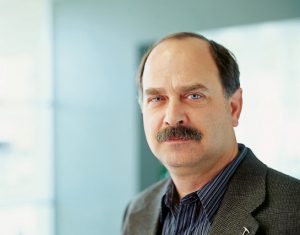By Bart J. Kowallis, ’77
Despite the many unanswerable questions in life, there are some things we can know with certainty.
By Bart J. Kowallis, ’77
WHAT I would like to share with you today is the only thing of which I am absolutely sure. That is: I know there is a God who knows each of us, who hears our prayers, and who loves us despite our shortcomings and imperfections.
During my early years in Pleasant View, Utah, all but a couple of families in town were ward members. I really didn’t know that any other churches existed, and later in my life it came as a bit of a shock to me to learn that everyone did not belong to the church I belonged to. I can’t say that I had a testimony of the truthfulness of the gospel because I really hadn’t thought about it much. I trusted my parents and their judgment.
Then it happened. One day during a deacons quorum meeting our advisor decided that we would have a testimony meeting. I suppose that we had about eight or 10 deacons in our quorum, and slowly one boy after another stood to share his testimony. I was almost panicky because I just didn’t know what I would say. I hoped that maybe the time would run out and I wouldn’t feel obligated to stand, but it did not; 10 deacons sharing their testimonies doesn’t take more than about 10 minutes, so plenty of time still remained when all of the other boys had finished. I stood awkwardly and recited the same basic things most of the others had said: “I love my mom and dad. I know the Church is true. I know Joseph Smith was a prophet.”
The thing was done, but for the first time in my life I realized that it was a lie. The only thing I had said that I really knew to be true was that I loved my mom and dad. I didn’t really know if the Church was true or if Joseph Smith was a prophet, but I knew then that I had to find out.
I don’t remember exactly when I finally asked, but I do remember that one night, when my two brothers who shared a room with me were sleeping, I knelt by my bed and pleaded with my Father in Heaven to forgive me for my weaknesses and to let me know if this church that I belonged to was truly His Church. I had never prayed with such intent before, and I am not sure I have ever prayed with such fervor since. I was only 12 or 13 years old, and yet I can still feel the power of the spiritual witness that came to me that night confirming that this was indeed the Church of Jesus Christ and that my Father in Heaven knew me and loved me. The test had worked, just as the scriptures promised.
But how is it possible for Him to know me? How does He have the time to worry about and contemplate someone as insignificant as I? Notwithstanding my feelings of total insignificance as I have pondered God and eternity, I have a deep assurance that He is there and that in some way He knows who I am.
In 1977 I graduated from BYU and headed out to Madison, Wis., where I had been accepted into the graduate program in geology. My major professor was Dr. Campbell Craddock. Cam spent summers working in Antarctica, Alaska, or in the islands of the Arctic. Students who followed in his footsteps were sure to be cold and wet during most of their graduate fieldwork. I signed on to work in Svalbard, a group of islands about 500 miles north of Norway. Four of us from Wisconsin, including Dr. Craddock, were deposited on the shore of an island called Spitsbergen in mid-July of 1978.
I was thrilled to be on shore, because for the three days of our voyage on the North Sea in the refitted fishing boat called the Polarstar, I had lain in bed, only rolling over occasionally to vomit into the bag I kept by my bunk.
During this time I was almost hoping the ship would sink and my pain would be over. I prayed and asked God for relief. Again my prayer was answered. The test worked, although not in the way I wanted–for into my mind came the following words: “My son, peace be unto thy soul; thine adversity and thine afflictions shall be but a small moment; . . . endure it well. . . . [and] all these things shall give thee experience, and shall be for thy good” (D&C 121:7–8 and 122:7). I tend to push aside or ignore the answers that I don’t want, hoping that the Lord will change His mind. But this does not often happen. Nonetheless, I was glad when the small moment of affliction had passed and we were able to step onto the solid earth. I was even able to smile again and realize that the experience was one that had been for my good. It had humbled me, brought me a better understanding of how much I needed my Father in Heaven, and, later in life, helped me to empathize more fully with my wife as she suffered through months of similar conditions during pregnancy.
During the first month in Svalbard we worked in teams of two as we examined the rocks and collected samples. The Norwegians who had transported us to the island warned us to be on the lookout for polar bears (and for seals, the polar bears’ main food). They explained that almost every year someone in Spitsbergen was killed and eaten by a bear.
As you can imagine, we were always looking out over the ocean and over the landscape to see if a bear was approaching. We were particularly cautious when seals came into the bay. We carried with us rifles and .45-Magnum revolvers wherever we went. We slept with the guns at our sides. There was no place to run or hide.
About midway through the field season, I worked alone for two weeks. Being truly alone for an extended period of time was a new experience for me. I was doing pretty well when one evening the fog rolled in off the ocean. The fog was particularly thick, and I was almost unable to see my hand when held out at arm’s length.
I ate and then retired to my tent, placing my rifle on one side of the bed and the pistol on the other. As I lay in bed, the sounds of the ocean were muffled by the fog and seemed different. I was sure I heard something moving along the beach. Fear slowly crept into my heart and soul. It was fear like I had never known before–the kind that makes a person think and behave in irrational ways. I was sure the sounds were the padding of a polar bear coming along the beach and it would not be long until I was discovered.
I sat up with the rifle in one hand and the pistol in the other in a state of panic, waiting for the inevitable to happen. It was then that I remembered I was not alone. I bowed my head and prayed fervently to my Father in Heaven to calm me and protect me. And He did. His Spirit engulfed me, the fear was gone, and I lay down and fell into a peaceful slumber. Once again the test had worked.
If these were the only incidents in my life when I had received answers to my prayers, then as a scientist I would probably be skeptical and pass these few experiences off as mere coincidences. However, I do not believe that I have ever had a sincere and fervent prayer that has not been answered.
It is my belief that God wants us to grow in spiritual strength by proving Him. At the close of the Book of Mormon, Moroni exhorts us to ask and promises God will reveal the truth unto us (see Moro. 10:4–5). To Oliver Cowdery He gave the challenge to “study it out in your mind; then . . . ask . . . if it be right” (D&C 9:8). To His disciples Jesus taught, “Ask, and ye shall receive; knock, and it shall be opened unto you” (3 Ne. 27:29; see also Matt. 7:7).
My sincere prayers are always answered. As I mentioned earlier, that does not mean I have always liked the answer. For example, when I was about 17 or 18 years old, my mother was diagnosed with cancer. She was given many blessings, and many prayers were offered. I prayed often that she would be healed. She fought the cancer valiantly and survived for about five years. One day, after I had returned from my mission, I was visiting with her and questioned why God had not answered our prayers–particularly since her patriarchal blessing had promised her a lifetime of good health. She did not hesitate in her response. She told me that God had given her a lifetime of good health. She had rarely been sick until now. Her life had been extended for several years when she might easily have passed away sooner. This was not the answer I wanted. But as I prayed again and pondered over what she had said, the Spirit confirmed to me that this was true.
In our communion with God we must ever be careful not just to talk but to listen. We must listen for His Spirit to guide and teach us. As we do, we must be willing always to mold our will to His will, for how can our prayers ever fail if we are willing to put our lives in His hands?  I have found that prayer works, that God never fails in His promise to us that He will be there for us. It is a test that each of us can make; it requires no sophisticated equipment, nor any federal grant money. And yet the results can be as incredibly exciting as any research performed with the best, most-expensive equipment. Better yet, the results gained by experimenting upon the Lord and upon His word will have consequences that reach far into the eternities. Even with innumerable questions that are unanswered and perhaps unanswerable in this life, we can know He lives and loves us and knows us.
I have found that prayer works, that God never fails in His promise to us that He will be there for us. It is a test that each of us can make; it requires no sophisticated equipment, nor any federal grant money. And yet the results can be as incredibly exciting as any research performed with the best, most-expensive equipment. Better yet, the results gained by experimenting upon the Lord and upon His word will have consequences that reach far into the eternities. Even with innumerable questions that are unanswered and perhaps unanswerable in this life, we can know He lives and loves us and knows us.
Bart Kowallis is a BYU professor of geology. His Oct. 14, 2003, devotional, “He Stands at the Door and Knocks,” from which this article is adapted, is available in full at more.byu.edu/kowallis.










